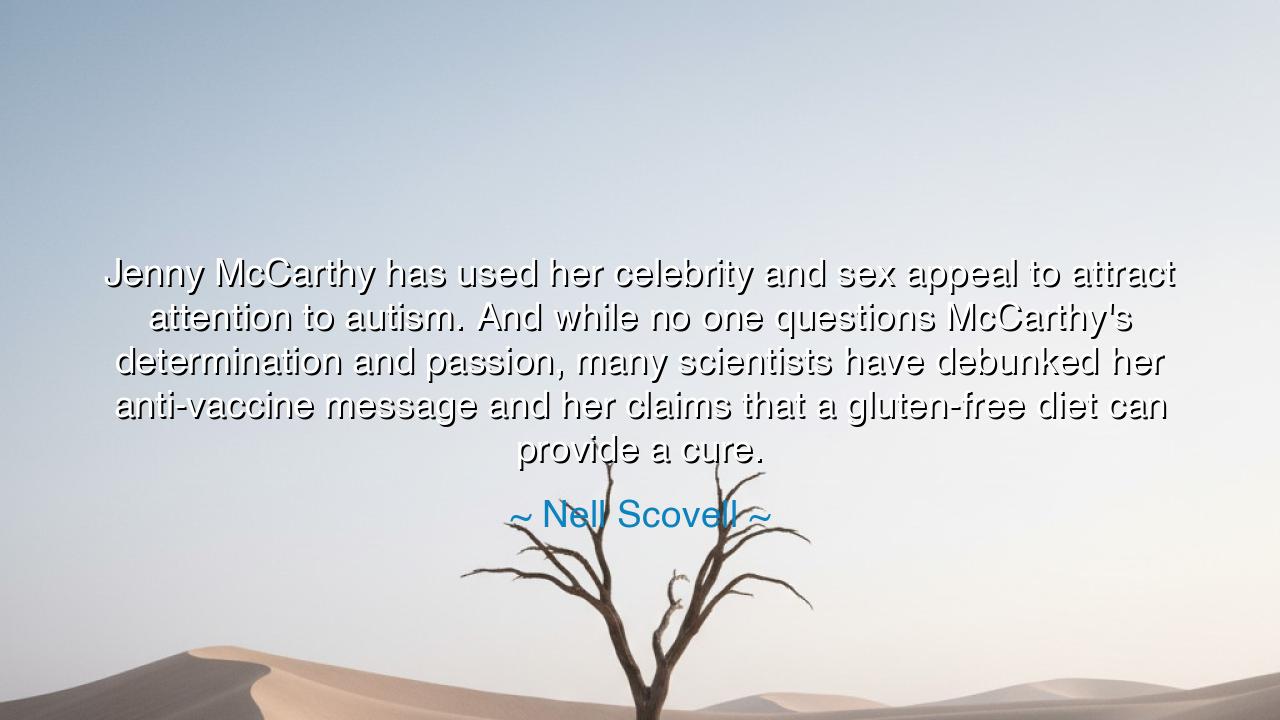
Jenny McCarthy has used her celebrity and sex appeal to attract
Jenny McCarthy has used her celebrity and sex appeal to attract attention to autism. And while no one questions McCarthy's determination and passion, many scientists have debunked her anti-vaccine message and her claims that a gluten-free diet can provide a cure.






In the words of Nell Scovell, “Jenny McCarthy has used her celebrity and sex appeal to attract attention to autism. And while no one questions McCarthy's determination and passion, many scientists have debunked her anti-vaccine message and her claims that a gluten-free diet can provide a cure.” Within these words lies not merely a commentary on fame or science, but a timeless lesson on the power and peril of influence, the tension between passion and truth, and the sacred responsibility of the voice that others choose to follow. Scovell’s reflection is not one of mockery, but of mourning — for she points to a truth humanity has seen in every age: that conviction without knowledge can become a weapon as dangerous as ignorance itself.
From the beginning of civilization, those with charisma and beauty, those gifted with presence and voice, have held sway over the hearts of many. Such power is neither evil nor good; it is neutral, like fire — capable of both illumination and destruction. Jenny McCarthy, as Scovell observes, turned her fame toward a cause born of compassion — the desire to help children afflicted by autism. Her intention was noble, her heart sincere. Yet, as the ancients would remind us, good intentions untethered from wisdom can lead even the righteous astray. For truth is not made by passion alone, but by the careful pursuit of evidence and reason.
In the great Library of Alexandria, it was said that the scholars prayed before study: “Let me not be deceived by my own certainty.” This ancient prayer echoes through Scovell’s observation. McCarthy’s certainty, though radiant with emotion, stood against the vast structure of scientific knowledge — against generations of healers, physicians, and scholars who sought truth not in rumor but in rigor. And when emotion challenges reason without proof, confusion takes root. Her message — that vaccines cause harm and that a gluten-free diet could cure autism — spread through the world like wildfire, carried by the winds of fear. The result was not enlightenment, but division. Parents turned against doctors, and faith in medicine wavered — all because the charisma of one voice outweighed the collective wisdom of many.
Yet, Scovell does not condemn McCarthy’s determination and passion — she honors them. For these qualities, rightly guided, are the lifeblood of progress. Throughout history, every movement that has changed the world has begun with passion — the flame that burns before reason can harness it. But fire, left untamed, consumes what it seeks to protect. In this, Scovell’s words carry both caution and compassion. The problem was not that McCarthy cared, but that she mistook conviction for truth. In her zeal to heal, she replaced evidence with belief, and belief with gospel. Thus, her influence — meant to uplift — cast shadows instead.
Consider the tale of Galen, the great Roman physician. For centuries, his writings on medicine were treated as sacred law. Yet when science advanced and his errors were revealed, many refused to let them go. Physicians clung to Galen’s authority as if to question him were heresy. In this, the world learned a painful lesson: when fame or legacy becomes the foundation of truth, truth itself is lost. So too in McCarthy’s story — for her fame, not her science, gave her voice its reach. And when people believe the famous before they believe the wise, they trade knowledge for comfort and reason for spectacle.
From Scovell’s reflection emerges a lesson fit for all ages: influence is a sacred trust. To speak to many is to bear the burden of guiding them rightly. Fame, like fire, can purify or destroy — and the measure of its worth lies not in how brightly it burns, but in what it illuminates. The wise must therefore listen not only to the speaker’s heart, but to the harmony of truth that supports it. Compassion without knowledge may soothe the moment, but only truth heals the ages.
So, let this teaching be carried forward: seek passion, but pair it with reason. Let your care for others be fierce, but let your knowledge be stronger still. Question even those you admire, and never let the beauty of a message blind you to the rigor of its proof. For the path to wisdom is not paved with certainty, but with humility. And when the world seems loud with false prophets and seductive ideas, remember this: compassion gives life meaning, but truth gives it direction.
Thus, as Nell Scovell reminds us, the true calling of the influencer, the teacher, the leader — indeed, of every voice raised before others — is not to be admired, but to enlighten. Passion may stir the heart, but only truth can heal it.






AAdministratorAdministrator
Welcome, honored guests. Please leave a comment, we will respond soon